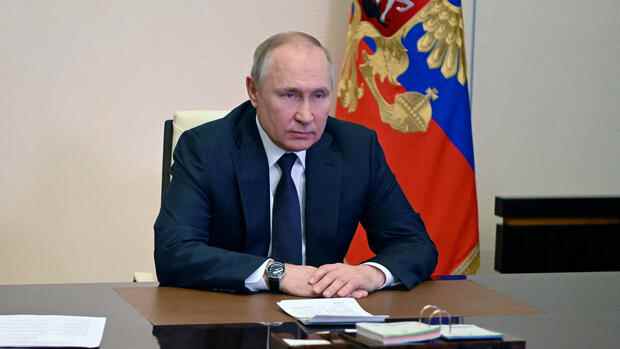Geneva It’s a small anniversary, but the mood is gloomy: while the 10th Review Conference of the Nuclear Non-Proliferation Treaty begins in New York on Monday, nuclear power Russia is undeterred in its war of aggression against Ukraine. After all, the treaty forms the foundation of the global nuclear order and is intended to help avoid a nuclear war.
But Russia’s campaign, backed by nuclear threats by President Vladimir Putin, is bringing the world closer to that abyss. UN Secretary-General António Guterres warns: “The prospect of a nuclear conflict that was once unthinkable is now once again within the realm of possibility.”
Most military and political experts rate the probability that Putin will actually use the destructive war machines as low. Former NATO Deputy Secretary General Rose Gottemoeller puts the chances of a nuclear strike by the Kremlin at “over one percent”. But hardly any expert completely rules out the horror scenario, as an evaluation in the “Bulletin of the Atomic Scientists” shows.
Even Putin’s wild conventional aggression together with the nuclear provocations cause horror among specialists. Sigfried Hecker, former director of the Los Alamos National Laboratory, even fears the collapse of the entire nuclear order and thus of the NPT: “I see that this order is being destroyed in every respect by what Putin has done in Ukraine – by the nuclear deterrence to non-proliferation to preventing nuclear terrorism and the future of nuclear power.”
Top jobs of the day
Find the best jobs now and
be notified by email.
Hecker’s statement may be too pessimistic. But one thing is certain: Putin is causing serious damage to the Nuclear Non-Proliferation Treaty (NPT).
>> Read also: How many nuclear weapons does Russia have?
The political leaders in the US see that too – the US is one of the major beneficiaries of the NPT. According to Secretary of State Antony Blinken, the US government is therefore aiming at the review conference to “maintain and strengthen this important treaty”. But diplomats fear that Russia’s bloody neo-imperialism could cripple the four-week conference: “If anything, there will be only meager results,” predicts a negotiator.
The nuclear powers committed themselves to disarmament
The USA, the Soviet Union and Great Britain were the first countries to sign the NPT in 1968, and it came into force two years later. The pact, which now has more than 190 contracting states, is based on a unilateral barter: it only allows five states to own nuclear warheads. They are the US, Russia, China, France and the UK.
All other countries do without the bomb. But you can use nuclear power peacefully. In return, the official nuclear weapons powers commit themselves to “general and complete disarmament”. But that’s exactly what the five nuclear powers want nothing to do with – complete disarmament. They benefit from the fact that the NPT does not specify a time frame for scrapping.
The two largest nuclear powers, the USA and Russia, together hoard more than 90 percent of the approximately 12,700 warheads, according to the Stockholm peace research institute Sipri. Most of these can cause greater destruction than the bomb that US forces dropped on the Japanese city of Hiroshima in 1945.
Indefinite-range nuclear-capable ICBMs are just one example of Russia’s arsenal of new nuclear weapons.
(Photo: dpa)
The armament comes at a price: According to estimates by the Congressional Budget Office, the US program for the modernization and maintenance of nuclear weapons alone will cost 1.2 trillion dollars over the next three decades. “All nuclear-armed states are increasing or modernizing their arsenals, and most are heightening their nuclear rhetoric and the role nuclear weapons play in their military strategies,” said Wilfred Wan, director of the SIPRI weapons of mass destruction program. “This is a very worrying trend.” Putin’s war is exacerbating this trend towards rearmament – contrary to the NPT’s call for disarmament.
And as long as Putin is at the controls, new negotiations between Washington and Moscow on arms control treaties are unthinkable. And talks with China also seem unrealistic at the moment: According to the Daily Telegraph, Great Britain’s national security adviser, Stephen Lovegrove, warns against China’s “contempt” for agreements to limit or reduce arms.
The West and China could even “miscalculate” and stumble into nuclear war. And Sipri states: “China is in the process of significantly expanding its nuclear arsenal, which, according to satellite images, also includes the construction of over 300 new missile silos.”
India, Pakistan, Israel and North Korea also have nuclear weapons
Likewise, the four “unofficial” nuclear weapons powers are likely to increase their stockpiles in the face of daring Russian nuclear maneuvers – India, Pakistan, Israel and North Korea already consider the use of their nuclear warheads a strategic option. “India is continuing to modernize its nuclear weapons arsenal,” observes the renowned armaments specialist Hans Kristensen.
>> Read also: Russia expert Heather Conley warns ‘we must prepare for the use of tactical nuclear weapons’
The Indian carrier systems are aimed at two other nuclear weapon states: China and Pakistan. “Almost all new Indian Agni missiles have a range that suggests China is their primary target,” notes Kristensen. And on Pakistan he writes: “The risk of a conflict escalation between India and Pakistan remains dangerously high.”
In addition, those states that have nuclear ambitions of their own are also following the Kremlin’s “special military operation” very closely: Iran in particular. It is hardly surprising that the international negotiations to contain Tehran’s nuclear program are dragging on.
Putin’s war, flanked by nuclear blackmail, also destroys hopes of an end to nuclear proliferation. But that is exactly what the Nuclear Non-Proliferation Treaty was supposed to achieve.
More: Nuclear Weapons – How Serious is Russia’s Nuclear Threat?
